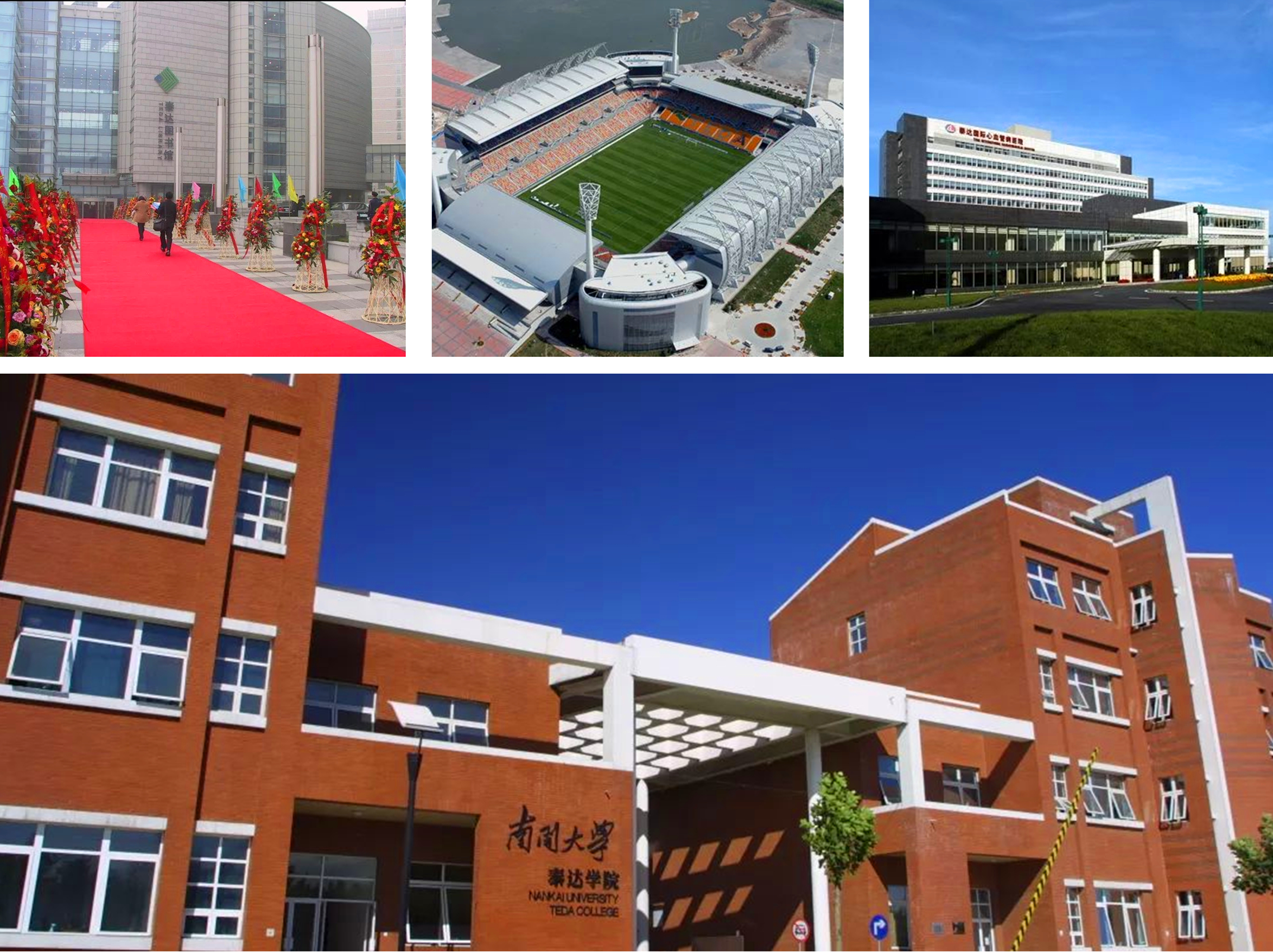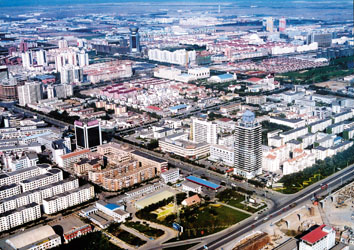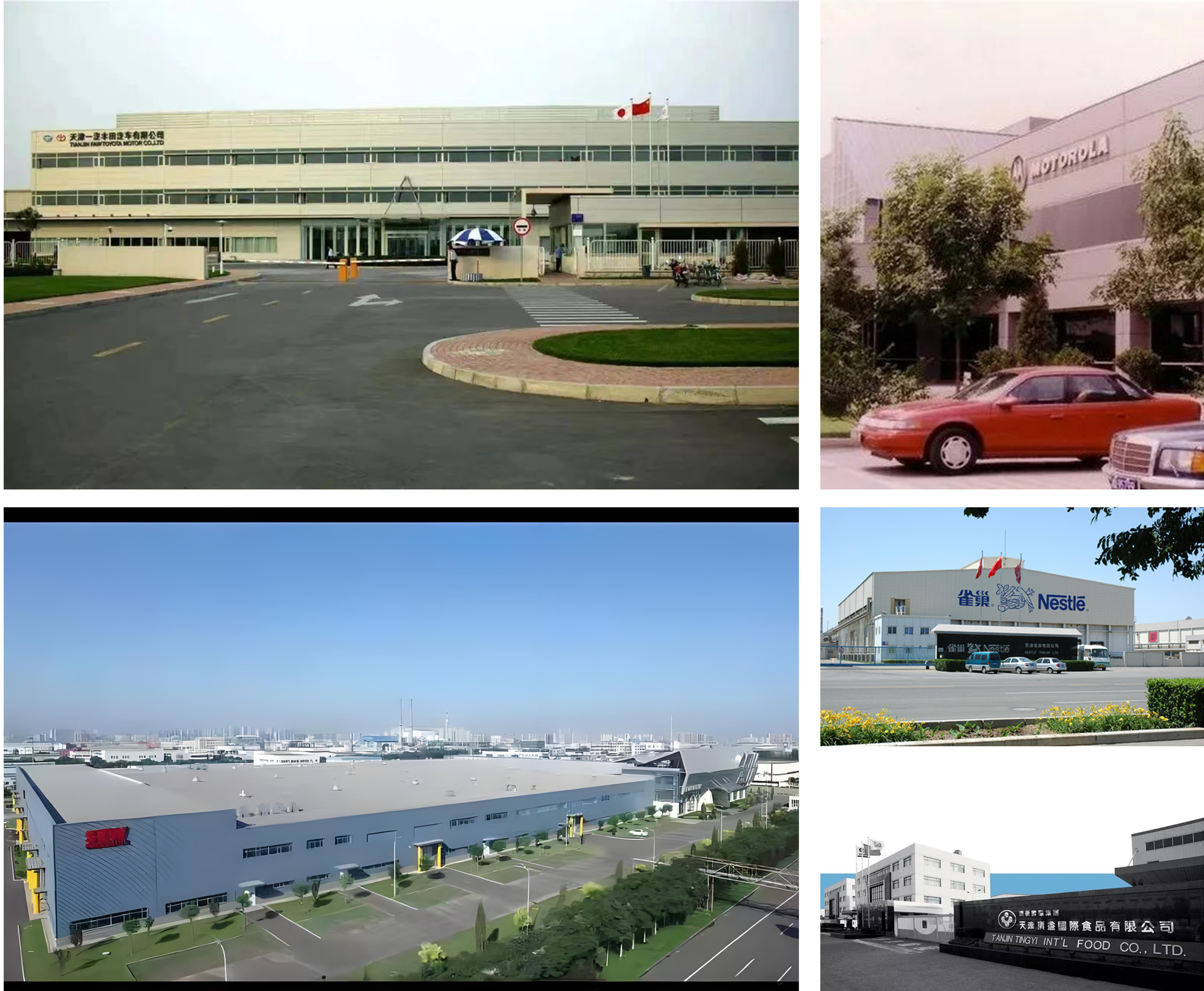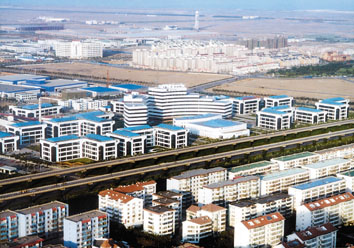Growing with Our Investors—Striving Forward to Build a New Type of Modern Industrial Park (2000-2004) (Part I)

Since the turn of the last millennium, TEDA has witnessed significant improvements in industrial development and business environment, with key economic indicators and overall development level ranking top among national-level development zones for consecutive years. A modern industrial park characterized by thriving industries and a beautiful environment has risen along the shores of the Bohai Sea.

A high-quality business environment is a crucial factor in attracting investment and promoting economic growth for any city, and TEDA is no exception. Commitment to advanced development concepts, urban construction endeavors, and unceasing service improvements helped TEDA secure investments. TEDA transformed from a barren saline wasteland into a vibrant modern industrial park, achieving a significant leap in its business environment. This improvement further fueled the prosperity of its industries and economy, allowing enterprises to take root and flourish. In this virtuous cycle, TEDA’s development was nothing short of rapid and transformative.
Unceasing Innovation in Development Concept
As one of China’s earliest 14 national-level development zones, TEDA was given the important mission of opening up to the world and attracting foreign investment from its inception. The pioneering TEDA people proposed the innovative concept of creating a “simulated international investment environment”. Under such guidance, TEDA improved the infrastructure condition from “three connections and land leveling” to seven and then to “nine connections and land leveling”. Its philosophy evolved from “Investors are kings, and projects are lifeblood” to “Services are also productivity” and to “100-1=0”, placing TEDA at the forefront of national-level development zones at each stage. Entering the new century, TEDA was the first to propose the concept of the “New Nine Connections and Land Leveling,” realizing an infrastructure system available in information, markets, laws, supporting facilities, logistics, capital, talent, technology, and services. TEDA also aimed to establish a new economic platform in the 21st century, with the goal of creating a world-class business environment and enhancing the region’s overall competitiveness.
Urban Infrastructure in Line with International Standards

Under a reasonable layout, TEDA’s urban construction made significant strides. By 2003, the total investment in infrastructure development had reached nearly $18 billion, transforming the cityscape dramatically. In November 2003, the Jinbin Light Rail began trial operations, establishing a vital transportation artery connecting TEDA with Tianjin’s central urban area. This greatly facilitated the business and trade between the two regions. Jinbin Light Rail together with highways, Tianjin Port, and Tianjin Airport formed an extensive transportation network that became a driving force for TEDA’s economic and social development.

TEDA placed a strong emphasis on functionality, human-centered philosophy, and cultural richness in its urban supporting construction, aiming to create a world-class city environment. With the landing of Tianjin University of Science and Technology and Nankai University TEDA College, TEDA established a comprehensive education system spanning from nurseries and preschool to nine-year compulsory education and higher education. Landmarks like the TEDA Tropical Botanical Garden, TEDA Football Stadium, TEDA Library, and TEDA International Cardiovascular Hospital emerged, making people’s life better.
In the new century, TEDA actively embraced the global wave of informatization, leading the nation in information technology development. As early as 2000, TEDA had formulated a comprehensive plan for its information infrastructure construction to promote the region’s informatization. Within just a few years, it built a fully fiber-optic, fully switched broadband metropolitan area network (MAN) that covered the entire zone. This advanced IT-based infrastructure seamlessly connected TEDA with the rest of the world, providing unprecedented convenience for business development and the work and life of its citizens.
Digital Services Become More Efficient and Convenient
The steadily improving digital information system has created favorable conditions for enhancing TEDA’s government services, giving rise to new service models. In 2000, TEDA Investment Service Center was established to offer one-stop services to enterprises. The center enabled online handling of tax, business registration, personnel management, etc., drastically reducing the time for applications and approvals from a week to just a few hours and significantly improving service efficiency. Additionally, digitalization made online and remote customs declarations a reality, greatly accelerating the clearance process for TEDA companies. In 2002, TEDA launched its call center, China’s first government contact center, integrating information technology into government services. This 24/7/365 center provided services such as consultations, queries, complaints, and repairs, which effectively enhanced communication between the government, enterprises, and citizens. TEDA’s government services improved great efficiency comprehensively.

An office automation (OA) system was also established within government institutions. The OA system enabled the digital circulation of official documents, enhancing information exchange and sharing. The coordination and cooperation among departments was strengthened, thereby greatly improving its administrative efficiency. This not only benefited government staff but also brought convenience to enterprises and citizens.
The implementation of online office systems, online approval processes, and the 24-hour call center, along with other e-government applications, brought highly efficient and convenient services to enterprises, public institutions, and citizens in TEDA. This further boosted the region’s overall investment attraction capabilities, shaping a city environment fully in line with international standards.


Thanks to the increasingly upgraded business environment, TEDA attracted leading global manufacturing companies to take root, driving robust urban development. Since 1997, TEDA has ranked first among national-level development zones for consecutive years in terms of key economic indicators and overall development level, making it one of the most dynamic and vibrant economic areas in both Tianjin and China. In 2000, Fortune magazine praised TEDA as “China’s Most Admired Industrial Park.” In 2003, the United Nations Industrial Development Organization (UNIDO) listed TEDA among the six most dynamic cities and regions in China.
Economy Sees Strong Growth with Competitive Industries Clustering

The dynamic development of TEDA offered high returns on investment. This boosted the global competitiveness of TEDA and reinforced the determination and confidence of multinational corporations in increasing their investments. By the end of 2004, TEDA had approved over 3,800 foreign-invested enterprises from 73 countries and regions and enterprises with investments from China’s Hong Kong, Macao, and Taiwan, with a total project investment amounting to nearly $25 billion. This led to significant advancements in both the regional economy and the industrial ecosystem. TEDA has established several high-value and high-tech industries, including an electronics and communications sector represented by Motorola, Samsung, Honeywell, etc., a pharmaceutical and chemical industry led by Novo Nordisk, Novozymes, and GlaxoSmithKline, etc., a machinery manufacturing sector featuring SEW Emerson, etc., and a food and beverage industry represented by Master Kong, Coca-Cola, Nestlé, etc. With the arrival of FAW Toyota’s automobile manufacturing plant, alongside key suppliers in the industrial chain like Toyota Transmission, Aisin Transmission, Yazaki, Panasonic, and Fujitsu Ten, a massive automotive industry cluster was rapidly taking shape.
During this period, TEDA transitioned from naturally shaping industry clusters by selectively attracting a wide range of enterprises to proactively and strategically introducing high-quality leading companies and superior corporations in the industrial chain. The development focus shifted from relying solely on the presence of large corporations to fostering and guiding the formation of key industry clusters according to detailed industrial development plans. TEDA made the Overall Planning for the Electronic Information Industry in Tianjin Economic-Technological Development Area and the Overall Planning for the Biomedicine and Modern Pharmaceutical Industry in Tianjin Economic-Technological Development Area to provide the region’s industrial development with policy support. Leveraging its leadership in electronics and communications and the rising automotive industry, TEDA actively promoted the synergy between these two sectors to further enhance its industrial agglomeration advantage.
Circular Economy Scores Remarkable Achievements
While achieving rapid economic growth, TEDA maintained a calm and clear recognition of its future development. With a forward vision, TEDA embraced the concept of building a “Green TEDA” and resolutely avoided the path of “environmental governance after pollution”. This sustainable development strategy has attracted numerous high-tech, reputable multinational corporations to the area. TEDA also established a series of high-standard environmental supply facilities, including wastewater treatment plants, electroplating wastewater treatment plants, recycled water plants, and modern energy supply systems. At the same time, TEDA proactively supported the development of circular economy across various industries, encouraging companies to cooperate with environmental facilities to reduce pollution. For example, after global enzyme leader Novozymes set up operations in TEDA, it successfully converted biological waste residue from production and activated sludge from wastewater treatment into organic fertilizers, which were later used on nearby farmland. Additionally, treated wastewater has been repurposed for urban landscaping irrigation and road cleaning. Numerous similar success stories can be found throughout TEDA.

Notably, TEDA has begun establishing an ecological circular network within its pillar industries to further advance sustainable development. In the automotive industry, TEDA specifically introduced companies to supplement the industrial chain that handle automotive waste, laying the foundation for a “metabolic network of the automotive industry.” Tianjin Rainbow Hills Cast Iron Co., Ltd. was a standout in this network. The company processed scrap materials from FAW Toyota’s production into steel ingots, which were then supplied to Toyota’s dies factory as raw materials for dies production. This created a symbiotic relationship between enterprises, reducing environmental pollution, enabling the reuse of waste materials, and generating significant profits. It represented a win-win result of environment and economy. To further promote the construction of this ecological circular network and accelerate the region’s circular economy, TEDA established a Waste Minimization Club in early 2004, a sub-project of the Industrial Solid Waste Management System initiative between TEDA and the European Union. Through the club, member companies participated in various waste minimization activities, and club experts regularly provided diagnoses to them, offering free solutions for reducing waste emissions and adopting cleaner production methods. These efforts provided tangible economic benefits to enterprises and encouraged them to adopt clean production practices as a long-term commitment, thereby promoting waste reduction, minimization, and harmlessness throughout the area.
TEDA’s commitment to sustainable development won global recognition. In 2001, TEDA was designated by the United Nations Environment Programme as one of China’s earliest pilot zones for environmental management in. In 2004, the Plan for the Construction of the National Eco-Industrial Demonstration Park of TEDA was approved by the State Environmental Protection Administration (SEPA), positioning TEDA as a leader in eco-industrial development.
As a key gateway for opening-up to the outside world, TEDA has emerged as a frontrunner in China’s neo-industrialization within just 20 years from scratch. TEDA’s growth has significantly contributed to the economic development of Tianjin and the surrounding areas, exerting an increasingly profound influence.













 津公网安备 12019002000128号
津公网安备 12019002000128号

